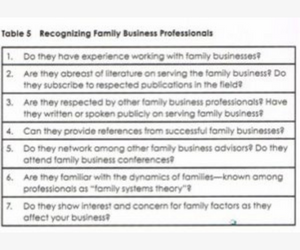Embedding The Family’s Values by Creating an Ethical Will
Original Article written by Mitzi can be found here.
Much as I admired Frank Perdue for his success with his family poultry business, I admired him even more for his success as a family man. Since the happiness of the families you advise will depend at least as much on the family members getting along as it will on the success of the business, it’s worthwhile putting the kind of effort into “family glue” that Frank did.
One of Frank’s efforts towards embedding the values that he felt would make his family happy was incorporated in his ethical will. In fact, it was one of the most meaningful and moving things he did for his family; he didn’t just leave them material things; he also “willed” them his values.
What is an “ethical will”?
Maybe the best way to explain it is by showing what it does. If you recommend to your clients that they create an ethical will, it can play a role in helping the children and those who come after them to have happy, productive lives. An ethical will can accomplish this by putting in writing the values that the head of the family believes will help his or her descendants. Ideally, an ethical will can become part of the family’s culture, and when the children and their children are looking for meaning and identity, an ethical will lets them know, “This is the kind of people we are.”
By the way, ethical wills are not something new; they’ve existed since Biblical times. I suggested that Frank use this ancient practice to help make sure his ideas were codified and could be passed down to future generations.
Frank’s ethical will was something of a joint venture for us. He was receptive to the idea because, by the time he was in his 80s, he had come to believe that people with integrity, that is, people who follow their highest values, will, at the end of the day, lead happier lives. These people gain self-respect, people trust them, and they have successful relationships not just with others, but with themselves.
Although Frank believed strongly in the importance of values, both of us had observed that an inheritance can short-circuit this process. There was a phrase we both related to: “Adversity breeds character. Prosperity breeds monsters.” Frank wanted to help guarantee that the values he cherished were front and center in the family’s culture.
You’ve probably observed, as we did when observing the children of other families of means, that over and over again, wealth without values leads to unhappiness. It can make children vulnerable to destructive behaviors such as, for example, substance abuse. Lack of values can turn heirs into playboys and can accelerate the arc of “shirtsleeves to shirtsleeves in three generations.”
By the way, Frank’s focus on values didn’t come out of the blue. Frank and his first wife, Madeline had been working to instill good values in their children from birth. However, in his 80s Frank was ready to embrace the idea of embedding the values in the family culture so they would still exist after his passing. We both felt that by putting the ideas in writing, and especially, knowing that these ideas would be read by his children during his funeral, that they would impact the family culture.
He and I spent three full days on the project. Frank would dictate his ideas, I’d type them, we’d discuss them, and then I’d type his changes. By the end of the process, there wasn’t a single word that Frank hadn’t put his heart into. He gave it the seriousness it deserved.
At his funeral, each grandchild read one of the parts of it. In the time since, every family member including new members through marriage, received a framed copy of this. Many of them keep Frank’s ethical will on their desk. I often hear family members referring to it, including buttressing an argument or a position by referring to it. It really is part of our culture.
 
Here is Frank’s Ethical Will:
- Be honest always.
- Be a person whom others are justified in trusting.
- If you say you will do something, do it.
- You don’t have to be the best, but you should be the best you can be.
- Treat all people with courtesy and respect, no exceptions.
- Remember that the way to be happy is to think of what you can do for others. The way to be miserable is to think about what people should be doing for you.
- Be part of something bigger than your own self. That something can be family, pursuit of knowledge, the environment, or whatever you choose.
- Remember that hard work is satisfying and fulfilling.
- Nurture the ability to laugh and have fun.
- Have respect for those who have gone before and learn from their weaknesses and build on their strengths.
Steps For Helping a Family Create Its Own Ethical Will
Here are some steps that work. Encourage the head of the family you’re advising to go through these steps:
- Analyze the values that work in your family.
- Make a list of all of these values.
- Brainstorm as many as you can. You may find that the ones that weren’t immediately obvious turn out to be the most valuable, so stretch to find more!
- Cut your list down to ten or fewer. A longer list risks losing impact.
- Try it out on some of your family members. They may have insights that are invisible to you.
- Think about it for a few days and then revise it.
- Plan how you’ll use it. Will it be read at your funeral? Do you want family members to know it now? Do you want to have copies engraved on a copper plate, which is given to each family member, signaling the importance of the document? Would you like to have it read at family reunions? Will it be available to non-family members?
- Be honest always.
- Be a person whom others are justified in trusting.
- If you say you will do something, do it.
- You don’t have to be the best, but you should be the best you can be.
- Treat all people with courtesy and respect, no exceptions.
- Remember that the way to be happy is to think of what you can do for others. The way to be miserable is to think about what people should be doing for you.
- Be part of something bigger than your own self. That something can be family, pursuit of knowledge, the environment, or whatever you choose.
- Remember that hard work is satisfying and fulfilling.
- Nurture the ability to laugh and have fun.
- Have respect for those who have gone before and learn from their weaknesses and build on their strengths.
- Analyze the values that work in your family.
- Make a list of all of these values.
- Brainstorm as many as you can. You may find that the ones that weren’t immediately obvious turn out to be the most valuable, so stretch to find more!
- Cut your list down to ten or fewer. A longer list risks losing impact.
- Try it out on some of your family members. They may have insights that are invisible to you.
- Think about it for a few days and then revise it.
- Plan how you’ll use it. Will it be read at your funeral? Do you want family members to know it now? Do you want to have copies engraved on a copper plate, which is given to each family member, signaling the importance of the document? Would you like to have it read at family reunions? Will it be available to non-family members?
The size of the family business isn’t going to be what makes the family members happiest. The deepest and most enduring happiness comes from loving and intimate relationships with our family members and closest friends. Don’t let the families you advise leave to chance the values that make these kinds of relationships possible.
Search Articles
Latest Articles
Ukraine’s Mental Health Crisis & AI Solutions
https://aablanco.substack.com/p/ukraines-mental-health-crisis-and?utm_source=post-email-title&publication_id=1780826&post_id=153290811 Publication –aablanco.substack.com
Tackling Trauma Through Artificial Intelligence
https://www.psychologytoday.com/us/blog/to-end-human-trafficking/202411/tackling-trauma-through-artificial-intelligence Publication –psychologytoday.com
The Diplomat Mitzi Perdue Nantucket Ukraine
https://www.n-magazine.com/the-diplomat-mitzi-perdue-nantucket-ukraine Publication –n-magazine.com
An Explosive Choice: Landmines and Ukraine
https://cepa.org/article/an-explosive-choice-landmines-and-ukraine/ Publication –cepa.org
Subscribe to Updates
About Author

Mitzi Perdue is the widow of the poultry magnate, Frank Perdue. She’s the author of How To Make Your Family Business Last and 52 Tips to Combat Human Trafficking. Contact her at www.MitziPerdue.com
All Articles
Choosing Your Family Business Advisors
Choosing Your Family Business AdvisorsKnow when you need to get help. People often ask me the secret of Frank Perdue’s success. He had to do hundreds of things right. He had to be able to see the big picture as well as be detail oriented. But there was something else:...
Substance Abuse and the Family Business
Substance Abuse and the Family Business When it comes to substance abuse, members of a family business are no more immune than the rest of the population. However, as family business advisor Loyd Rawls points out, the consequences can be more dire because serious...
Infertility: Advances In Treatment
Infertility: Advances In TreatmentAge and Infertility are Linked Infertility affects roughly 12% of women. By the time a woman is in her early 40s, her chance of infertility rises to 20%. It’s a particularly difficult problem for the older woman because the quality...
Career Advice for Young People: Shut Up and Listen!
Career Advice for Young People: Shut Up and Listen! Jack Tatem, a former Perdue Vice President, has some serious advice for young people. It’s simple and it can make a big difference in your career. It has to do with listening. The advice is, “Shut up and listen!” He...
6-Step Solution to Almost Any Problem
6-Step Solution to Almost Any Problem 1. Describe the Problem. Preferably do this in writing. The act of putting the problem into words can clarify your thinking. 2. Write Down the Obstacles. Although I’m a fan of positive thinking, I’m also a fan of research...
A Diabetes Management, Current Therapies
A Diabetes Management, Current Therapies The Bionic Pancreas Offers New Hope For type 1 Diabetes There’s good news for those with type 1 diabetes. The FDA has just approved a device (Medtronic MiniMed 670G) that automates keeping their blood sugar at healthy levels. ...





